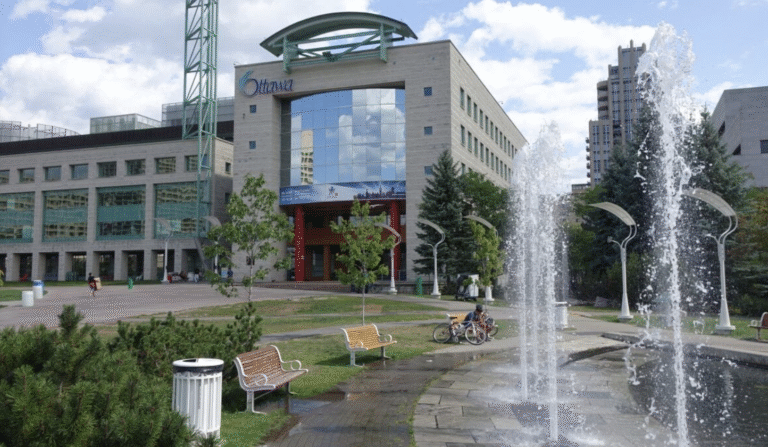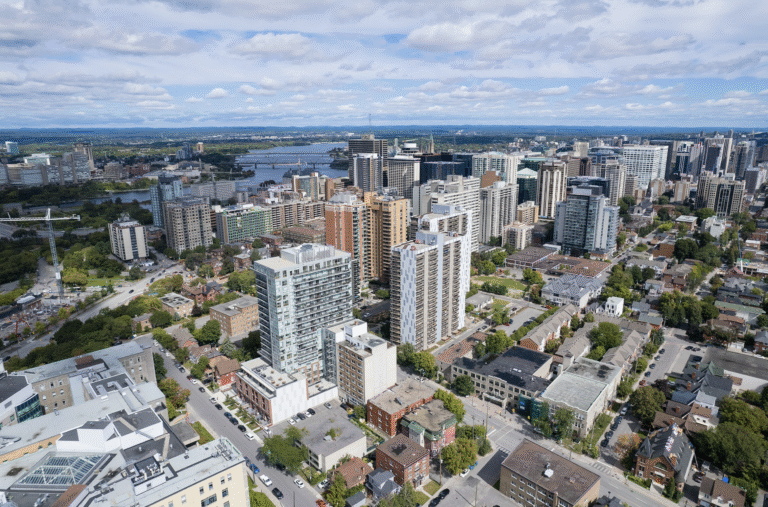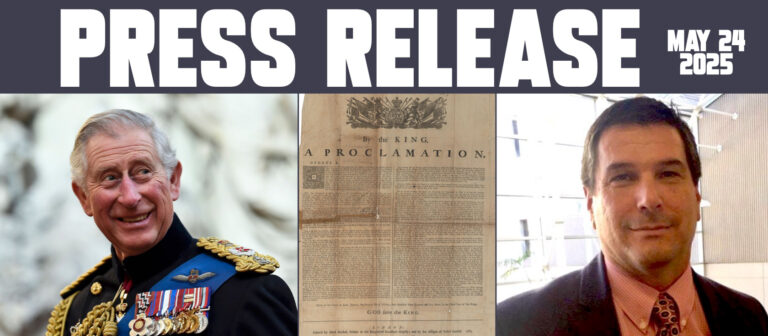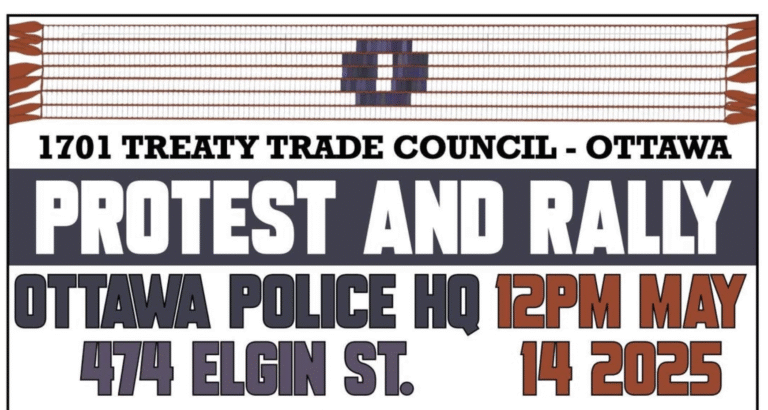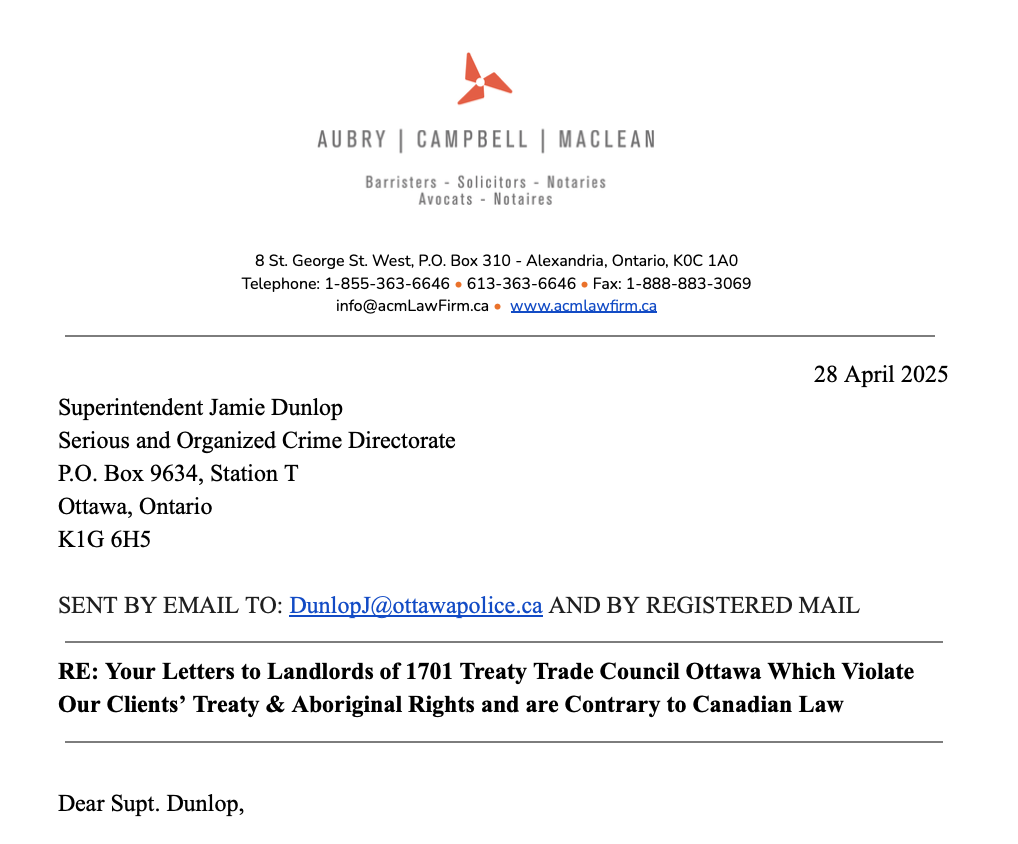
On April 25th, 2025 the law firm Aubrey, Campbell, Maclean sent the following letter to Supt. Jamie Dunlop of the Ottawa Police Services. To read the additional Annexes to the letter, view the PDF above.
April 25, 2025
Dear Supt. Dunlop,
We are legal counsel to certain members of the 1701 Treaty Trade Council Ottawa, the association of Algonquin and Mohawk cannabis traders operating within the City of Ottawa. Attached as Annex “A” is a copy of the Council’s Certificate of Inherent Rights Recognition and Registration. Our clients have always wished to operate lawful enterprises within the City of Ottawa in the course of exercising their Treaty and Aboriginal rights pursuant to ss. 25 and 35 of the Constitution Act, 1982, in pursuit of their Indigenous rights to economic development, as fully adopted and recognized within Canada by the United Nations Declaration on the Rights of Indigenous Peoples Act, S.C. 2021, c. 14 in order to support themselves, their families, and their peoples. The UNDRIP Act confirmed at s-s. 4(a) “the Declaration is a universal international human rights instrument with application in Canadian law,” and noted in its Preamble: “the rights and principles affirmed in the Declaration constitute the minimum standards for the survival, dignity and well-being of Indigenous peoples of the world, and must be implemented in Canada … Whereas there is an urgent need to respect and promote the rights of Indigenous peoples affirmed in treaties …”
In particular, our clients are the beneficiaries of several solemn Treaties concluded between the Crown and the Algonquin and Mohawk peoples, including the Covenant Chain. These Treaties entitle our clients to consultation and accommodation concerning their rights when there is a risk that the laws of Canada or Ontario may unreasonably infringe upon their rights. The Senate of Canada Standing Committee on Indigenous Peoples in its report “On the Outside Looking In: The Implementation of the Cannabis Act and its Effects on Indigenous Peoples” (June 2023) recounted evidence that “the federal government did not adequately engage in substantive consultations with First Nations communities before decriminalizing cannabis. The committee finds that the federal government has not meaningfully consulted First Nations governments since the Act came into force … these consultations left out important topics like economic opportunities for First Nations … First Nations seemed to be an afterthought” (at p. 10).
As you will know as a senior commissioned Ottawa Police Service officer, the City of Ottawa has officially recognized on the City of Ottawa website at https://ottawa.ca/en/city-hall/creating-equal-inclusive-and-diverse-city/indigenous-relations # under the heading “Honouring the Anishinabe Algonquin Nation, First Nations, Inuit and Métis peoples” that “Ottawa is built on un-ceded Anishinabe Algonquin territory.” Under “Official Statement of Reconcilation” the Ottawa City Council has committed to “taking action to ensure the needs and aspiractions of Aborginal people are fully acknowledged in policy” where the Council has committed “to a new equal partnership with Aboriginal peoples in Canada; one based on truth, dignity, and mutual respect.” It is our considered opinion that the actions of the Ottawa Police Service in these matters so violate the constitutionally protected rights of our clients that the actions are in direct contravention of City of Ottawa Policy, as well as the Treaty and Aboriginal rights of our clients as protected by the Constitution Act, 1982.
Rather than seeking to engage in an “equal partnership” which the City of Ottawa espouses, both the City and the Ottawa Police Service have failed to engage with our clients in working out reasonable consultation and accommodation of their Treaty and Aboriginal rights. The City and OPS appear to be evading a lawful testing of our clients’ rights in an independent, objective court of law through failing to directly charge Indigenous individuals who could invoke their Treaty, Aboriginal and other rights in their own defence. Rather, you have been indirectly undermining our clients exercise of their rights, through writing to the landlords of our clients threatening them with prosecution including fines and imprisonment if they continue to lease premises to our clients, while rather self-contradictorily in your landlord letters you note: “We recongize that … this area, including the City of Ottawa, is part of unceded Algonquin territory. The OPS acknowledges the importance of respecting Indigenous rights and advancing reconciliation … The OPS also bears the responsibility of ensuring compliance with relevant laws.”
We could not agree more with the foregoing statement of your responsibilities. However, you can’t have it both ways, saying you support Indigenous peoples, but then saying you will only enforce laws that harm those peoples which unreasonably restrict their rights to engage in economic development on their own uncedeed territory like the Cannabis Act and Cannabis Control Act which do no accomodate Indigenous participation in the cannabis industry, rather than upholding the laws which protect them and promote their development, like the Treaties including the Convenant Chain. The ongoing binding nature of those Treaties have been explicitly recognized in the ground-breaking decision of R. v. Montour, 2023 QCCS 4125 which found in imposing stays of proceedings on all charges against the accused in that case: “The Court concludes that the Crown has infringed its obligation under the Covenant Chain. The evidence demonstrates that the Crown did not discuss … to any relevant degree, much less with an open mind, and even less with the intention of coming to one mind in accordance with the Covenant Chain’s precepts.” The Federal Court in Kebaowek First Nation v. Canadian Nuclear Laboratories, 2025 FC 319 has now found that R. v. Montour is applicable within Ontario’s geography. For a more detailed discussion of one of our clients’ sets of rights in the Mohawk context related to cannabis sales (who operates My Legacy Cannabis), we attach as Annex “B” the Notice of Constitutional Question in R. v. Fisher now pending before the Ontario Superior Court of Justice.
We also understand that the OPS asserts that the landlords of the Treaty Council members can consent to police searches of the members’ business premises, without any consent being obtained from the tenant members themselves. This is an indefensible legal position to take, being contrary to the s. 8 Canadian Charter of Rights and Freedoms jurisprudence concerning the requirement for prior judicial authorization for search and seizure in locations where there is a reasonable expectation of privacy. The Treaty Council members have the right of quiet enjoyment of their business premises under Ontario law. The OPS requires judicial prior authorization to conduct searches and seizures of these premises, and risks a variety of judicial remedies being imposed against the OPS for violating s. 8 Charter rights.
We also are of the opinion that the actions of the OPS and the City of Ottawa concerning urging the landlords to evict our clients from their lawful pursuit of their right to economic development contravenes the Ontario Human Rights Code, R.S.O. 1990, c. H.19. In particular, s. 1 which gurantees that “Every person has a right to equal treatment with resepct to services, good and facilities, without discrimination because of race, ancetry, place of origin, colour, ethnic origin” as well as s. 3 “Every person having legal capacity to contract has a right to contract on equal terms without discrimination.” In order to avoid a claim being submitted to the Ontario Human Rights Commission by our clients for Ontario Human Rights Code breaches by the OPS, the City of Ottawa, and by the landlords should they take action against our clients after your letters to them, we urge everyone involved in these matters to collaborate on resolving the issues raised in this letter in the spirit of reconciliation with Indigenous peoples which you yourself claim to support, rather than taking a conflictual entirely adversarial approach.
We propose that we meet with you and other City of Ottawa officials to discuss how our clients may be properly consulted and accommodated concerning their Indigenous rights prior to you taking any additional enforcement action, and that you immediately pause your efforts to place pressure on the landlords to evict our clients. You cannot concede in your letters to the landlords that at least some of our clients have Indigenous rights on their unceded land, while at the same time acting as if our clients have no rights whatsoever. We urge you personally, the OPS and the City of Ottawa to have the courage of your professed convictions by engaging with us and our clients to resolve the issue of Indigenous cannabis sales through an equal partnership based on truth, dignity and mutual respect.
We will make ourselves available to meet with you and other City of Ottawa officials at your convenience, either in person or by remote means. We look forward to hearing from and working with you.
Yours truly,
| Gordon S. Campbell Barrister & Solicitor gordon@acmlawfirm.ca | Gary Chayko Barrister & Solicitor gchayko@gmail.com |
